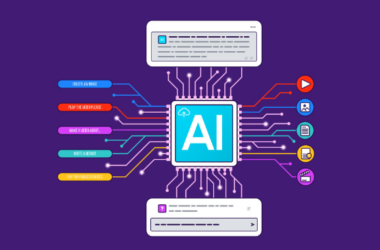Introduction
The introduction of Generative AI is a giant step towards a smarter, more productive future in today’s dynamic environment of data-driven decision-making. This groundbreaking technology has revolutionized how businesses analyze and interpret data, offering unparalleled insights and augmenting decision-making in ways never before thought possible.
Generative AI in decision-making, often called the avant-garde of artificial intelligence, is more than just a buzzword; it’s a game-changer. By leveraging advanced algorithms, it can create, generate, and predict data, enabling organizations to make informed choices with greater precision and confidence.
Whether forecasting market trends, optimizing supply chain operations, or personalizing customer experiences, Generative AI is the linchpin that drives innovation in business strategies.
In this blog, we will delve deep into the transformative power of Generative AI in decision-making. We will explore the myriad services and tools available, uncover ethical considerations in decision-making that come with such capabilities, and shed light on measuring the true impact of AI on business decisions.
Moreover, we’ll venture into the future, where the synergy of human expertise and AI-driven insights will reshape the decision-making landscape as we know it. So, fasten your seatbelts as we embark on a journey into the realm of Generative AI, where data isn’t just information; it’s the driving force behind smarter, more successful businesses. Welcome to the future of decision-making – powered by Generative AI.
The Power of Generative AI in Data-Driven Decision Making
-
Redefining Decision-Making Processes
Generative AI in decision-making is ushering in a profound transformation in traditional decision-making processes within businesses. With its capacity to generate data, predictions, and insights, Generative AI stands as a formidable ally in the quest for more informed and efficient decision-making.
One of the most striking features of Generative AI is its ability to analyze vast business data swiftly and comprehensively.
Gone are the days of laborious manual data crunching; Generative AI services have automated this process, enabling organizations to extract meaningful insights at unprecedented speeds.
This saves time and empowers decision-makers with real-time information, enhancing businesses’ agility in dynamic markets.
Generative AI doesn’t merely assist; it augments decision-making. Providing AI-enhanced decision support empowers professionals to make choices backed by data-driven intelligence.
It offers valuable suggestions, identifies trends, and predicts potential outcomes, minimizing risks and optimizing opportunities.
However, as businesses embrace Generative AI, ethical considerations must be noticed. Striking the right balance between automation and human judgment is crucial.
Additionally, measuring the true impact of AI on business decisions is an evolving challenge that demands continuous evaluation and refinement.
The future of AI in decision-making promises to be even more exciting. As Generative AI advances, it will refine its abilities, becoming an indispensable partner in the decision-making journey. It will redefine how businesses operate, innovate, and thrive in an ever-evolving landscape.
-
Leveraging Big Data Insights
A key component of using a large amount of big data to guide and improve decision-making processes is generative AI. Generative AI services enable enterprises to navigate the information sea more efficiently with complex algorithms and deep learning capabilities.
Analysis of business data with generative AI is revolutionary. It comprehends patterns, trends, and anomalies within enormous datasets, going beyond merely processing data. This gives decision-makers a better grasp of their operating environment by converting raw data into actionable insights.
Judgment rather than replacing it. It gives decision-makers the resources to confidently make well-informed decisions by providing data-driven recommendations, forecasts, and scenario evaluations.
However, in this AI-driven environment, ethical issues are quite important. A critical issue is finding the ideal balance between AI-driven insights and human judgment while protecting data privacy.
Measuring the genuine impact of AI on business decisions becomes increasingly important as we move forward. As Generative AI establishes itself as a crucial ally and ushers enterprises into a more knowledgeable, adaptable, and wealthy era, the future of AI in decision-making promises constant evolution.
-
Enhancing Predictive Analytics
Generative AI modernizes predictive analytics, ushering in an era of more precise and perceptive predictions. With the aid of its sophisticated algorithms and deep learning skills,
Generative AI can examine enormous datasets, spot obscure patterns, and produce predictions with astounding accuracy. It goes beyond conventional statistical techniques, allowing organizations to confidently predict upcoming trends, consumer behavior, and market changes.
By enabling proactive decision-making, resource optimization, and adaptation to changing conditions, this better predictive skill enables firms to gain a strategic edge in an environment of rising competition.
-
Real-Time Decision Support
With its AI-driven decision strategies, generative AI is at the forefront of enabling real-time, on-the-fly decision-making. Professionals negotiating complex situations find generative AI an important tool in various fields.
One unique capability is its ability to quickly adapt to changing conditions, continuously evaluate real-time data, and provide dynamic decision models. This capability allows organizations to respond quickly and successfully to unforeseen situations.
Furthermore, the importance of Generative AI in supporting ethical decision-making cannot be emphasized. It aligns with ethical business practices by considering various aspects, such as compliance, fairness, and transparency.
This guarantees that the choices made are morally and environmentally responsible in addition to being quick. Generative AI emerges as a reliable ally as industries depend increasingly on data-driven insights by providing real-time support for crucial, instantaneous decisions.
The landscape of decision support in the contemporary business world is changing due to its agility and dedication to responsible decision-making.
-
Customized Decision Models
Generative AI empowers businesses to craft bespoke decision models tailored to their needs. This revolutionary technology, embedded in Generative AI services, enables organizations to harness the full potential of their data.
Business data analysis with Generative AI goes beyond standardized approaches, allowing companies to extract insights specific to their operations. It dives deep into data, uncovering patterns and trends that might need to be noticed by conventional methods.
AI-enhanced decision support further amplifies this customization. Generative AI collaborates with human decision-makers to create models aligned with their objectives, leveraging the insights unearthed during data analysis.
Ethical considerations remain a cornerstone, ensuring customized models adhere to ethical standards. Moreover, measuring AI’s impact on business decisions helps refine and optimize these models.
The future of AI in decision-making lies in the unique ability of Generative AI to provide tailor-made solutions, aligning data-driven insights with a company’s vision and goals, thus fostering innovation and competitive advantage.
Generative AI Revolutionizing Sectors: A Closer Look
Healing with Precision: Generative AI’s Impact on Healthcare
- Data-driven AI decision models are used in healthcare using generative AI.
- Examining extensive patient data assists in accurate diagnosis.
- Responsible AI decision support guarantees moral treatment procedures.
- Based on information relevant to each patient, it customizes therapy choices.
- Medical experts can make more educated decisions thanks to generative AI.
From Calculations to Predictions: Generative AI in Finance
- Generative AI in the financial sector improves risk management decisions.
- It employs data-driven AI decision models for risk assessment.
- Responsible AI decision support ensures ethical practices in finance.
- Generative AI analyzes vast financial data to identify risks.
- It provides real-time insights, aiding in proactive risk mitigation.
Demand, Data, and Decisions: Generative AI’s Retail Renaissance
- Generative AI revolutionizes retail by optimizing inventory management.
- It analyzes historical sales data and market trends for accurate forecasting.
- Retailers benefit from reduced overstock and stock outs, improving profitability.
- AI-driven demand forecasting ensures efficient inventory levels.
- Generative AI adapts to changing consumer behaviors and preferences.
Innovations on the Assembly Floor: Generative AI’s Manufacturing Impact
- Generative AI enhances manufacturing by optimizing processes.
- It analyzes vast data sets to identify inefficiencies and areas for improvement.
- AI-driven insights lead to better resource allocation and cost savings.
- Manufacturers benefit from increased production efficiency and reduced downtime.
- Generative AI provides real-time monitoring and predictive maintenance.
From Watts to Wisdom: Generative AI’s Energy Resource Insights
- The energy industry uses generative AI to decide how to allocate resources.
- The distribution of energy resources is optimized by extensive data analysis.
- AI-driven insights increase the effectiveness of energy distribution and generation.
- Rapid responses to changes in demand are made possible through real-time monitoring.
- Sustainability and energy waste are both improved by generative AI.
Overcoming Challenges and Ethical Considerations
1.Data Privacy and Security
Data security and privacy issues are problematic when using generative AI for decision-making.
- Data Vulnerability: Because generative AI relies on large datasets, it is tempting for hackers to target these systems. These databases must be protected at all costs to avoid data breaches and misuse.
- Privacy worries: Sensitive customer or corporate information is frequently present in the data utilized in generative AI. To reduce privacy threats, it is essential to guarantee privacy compliance and anonymize data.
- Ethical Usage: The use of AI in an ethical manner is crucial to avoiding moral conundrums. Clear restrictions must be in place to prevent the misuse of AI-generated content creation.
- Fairness and Bias: Generative AI algorithms may unintentionally reinforce biases seen in training data, resulting in unfair results. It is crucial to use careful monitoring and bias mitigation techniques.
- Fairness and Bias: Generative AI algorithms may unintentionally reinforce biases seen in training data, resulting in unfair results. It is crucial to use careful monitoring and bias mitigation techniques.
- Regulatory Compliance: To prevent legal ramifications, it’s crucial to abide by data protection laws like GDPR or HIPAA.
It takes a complete approach to balance the enormous potential of Generative AI and data privacy and security issues, including strong encryption, strict access limits, and constant ethical oversight to ensure responsible and secure decision-making processes.
2. Bias and Fairness
Leveraging Generative AI in decision-making presents a significant ethical concern regarding bias and fairness. These concerns stem from Generative AI models learning from historical data, which may contain inherent biases. Here’s why this issue is critical:
-
- Amplification of Bias: Generative AI can unintentionally amplify existing biases in the training data. This can lead to discriminatory outcomes, reinforcing unfair practices.
- Unfair Impact: Biased decisions generated by AI can disproportionately affect certain groups, leading to inequities in areas like hiring, lending, or access to services.
- Transparency: The opacity of AI algorithms makes it challenging to understand and rectify bias. This lack of transparency hinders accountability and ethical oversight.
- Ethical Responsibility: Organizations deploying Generative AI have a moral obligation to ensure fairness and equity in their decisions, which may require ongoing bias monitoring and mitigation efforts.
Addressing bias and fairness in Generative AI involves robust data preprocessing, ongoing model evaluation, and transparency in decision-making processes. Ethical considerations must be at the forefront to mitigate these concerns and ensure responsible AI-driven decision-making.
3. Accountability and Transparency
In AI-driven decision-making, openness and accountability are essential. Accountability ensures businesses accept ownership of AI systems’ results, promoting confidence. Transparency helps consumers comprehend and evaluate decisions made by AI by revealing how decisions are produced.
These guidelines are essential for spotting and correcting biases, assuring ethical behavior, and abiding by the law. They support ethical and responsible AI deployment, increasing trust among users and stakeholders and lowering the risks connected to AI-driven decisions.
4. Human-Machine Collaboration
Human-machine collaboration is paramount for ethical and responsible decision-making with Generative AI.
While AI offers data-driven insights, human oversight is essential to ensure ethical guidelines are followed, biases are identified and corrected, and decisions align with ethical principles.
This partnership harnesses the strengths of both humans and AI, creating a checks-and-balances system that fosters trust, accountability, and responsible AI deployment, ultimately leading to more ethical and fair decision-making processes.
5. Regulatory Compliance
Implementing Generative AI in decision-making necessitates compliance with a complex web of regulatory frameworks, such as GDPR, HIPAA, or industry-specific standards. These regulations require organizations to safeguard data privacy, maintain transparency, and mitigate bias. Non-compliance can result in legal consequences and reputational damage.
Consequently, businesses must invest in robust compliance measures, including data encryption, access controls, and continuous monitoring, to ensure that their Generative AI deployments adhere to the highest ethical and legal standards.
Measuring Impact and Future Visions
Key Performance Indicators (KPIs)
A set of Key Performance Indicators (KPIs) covering all facets of generative AI’s influence on business choices is necessary. The following are some crucial KPIs:
- Decision Accuracy: This demonstrates how Generative AI can improve decision-making by comparing the accuracy of decisions made using it to those made using more conventional methods.
- Efficiency Improvement: Monitoring the time and money saved by employing Generative AI for decision assistance and demonstrating its influence on operational efficiency.
- Revenue Growth: KPIs should reflect how much Generative AI contributes to revenue growth through improved customer experiences, personalized offerings, and optimal decisions.
- Revenue Growth: KPIs should reflect how much Generative AI contributes to revenue growth through improved customer engagement, personalized offerings, and optimal decisions.
- Cost Reduction: Cost-saving initiatives are highlighted, including those that use Generative AI to reduce manual labor, minimize errors, and optimize resource allocation.
- Ethical Compliance: Ensuring that decisions made by AI are in keeping with morally upright corporate procedures and monitoring adherence to moral standards.
- Bias Mitigation: Assessing the efficiency of generative AI in locating and minimizing biases in decision-making processes is known as “bias mitigation.”
- Customer satisfaction: Analyzing increases in customer loyalty and satisfaction brought on by tailored offerings and better decision assistance.
- Data privacy: Evaluating the security of sensitive data utilized by generative AI and compliance with data protection laws.
These KPIs offer a thorough picture of how Generative AI affects business choices, ensuring both effectiveness and moral, client-centered, and legal choices. These KPIs will keep changing as businesses increasingly rely on AI to achieve success while upholding moral and responsible standards in the future of AI in decision-making.
AI-Enabled Predictions
For companies looking to forecast outcomes with accuracy, generative AI is a potent tool in their toolbox. This technology finds complex patterns and trends by studying enormous amounts of historical data that can escape human analysts.
Identifying tiny relationships that result in more accurate forecasts goes beyond conventional statistical methods. Generative AI enables businesses to foresee changes and modify their plans, whether they are predicting market trends, consumer behavior, or supply chain dynamics.
Predictions are guaranteed to remain accurate in changing circumstances thanks to their capacity for continuous learning and adaptation. In essence, generative AI helps businesses stay ahead by catalyzing better-informed decision-making in today’s dynamic and competitive world.
The Roadmap to AI-Driven Decision Excellence
The ultimate roadmap to AI-driven decision excellence is as under:
- Assessment: Identify decision areas where Generative AI can provide value.
- Data Preparation: Clean and structure data for model training.
- Model Selection: Choose suitable Generative AI algorithms.
- Training and Testing: Train models on historical data and validate accuracy.
- Integration: Seamlessly integrate Generative AI into decision processes.
- Monitoring: Continuously monitor model performance and make adjustments.
- Ethical Framework: Implement ethical guidelines to address biases and fairness.
- User Training: Train employees to collaborate effectively with Generative AI.
- Evaluation: Regularly assess Generative AI’s impact on decision outcomes.
- Scalability: Plan to scale Generative AI to meet evolving business demands.
Future Visions of AI-Driven Decisions
The future of AI-driven business decisions holds immense promise. Advancements will likely include:
- Hyper-Personalization: Through AI, client experiences will be highly customized.
- Improved Forecasting: AI will provide more accurate predictions, optimizing resource utilization.
- Moral AI: Stricter moral standards will guarantee ethical AI deployment.
- Decision-Making Augmented by AI: AI will support human expertise, leading to better business decisions.
- Real-Time Insights: AI will offer quick, data-driven insights enabling prompt action.
- Industry Transformations: AI will transform various industries, altering how companies run and innovate.
The Ethical Imperative
Making ethical AI decisions is not only a choice but necessary for a sustainable future. The impact of AI systems on society and the environment is growing as they become more prevalent across various fields.
For many reasons, it is essential to ensure that AI-driven judgments uphold ethical norms and values. First, ethical AI ensures that decisions are made fairly and equally by preventing the spread of prejudice and discrimination. Additionally, it protects data privacy and shields people from invasive procedures.
Additionally, moral AI decision-making encourages openness and responsibility, enabling people to comprehend how decisions are made and who is accountable.
Responsive AI can be crucial in addressing complex global problems like climate change, resource scarcity, and social inequity in a way that is both ethical and sustainable. AI-driven decisions can benefit people, businesses, and the environment by emphasizing moral behavior, helping to create a future in which technology is a force for good.
Conclusion:
In this blog, we’ve delved into the transformative potential of Generative AI in business decisions, highlighting key takeaways that underscore its significance in reshaping the decision-making landscape.
- Data-Driven Precision: Generative AI leverages vast datasets for nuanced insights, enabling more informed and precise decision-making in marketing, finance, and operations.
- AI-Enhanced Decision Support: It is a strategic partner to human decision-makers, offering AI-enhanced decision support that streamlines processes and augments decision quality.
- Ethical Considerations: The ethical implications of Generative AI are critical. Striking the right balance between automation and human judgment, addressing biases, and safeguarding data privacy are ethical imperatives.
- Impact Measurement: To fully harness its potential, businesses must measure the impact of Generative AI on their decisions. Key performance indicators (KPIs) should be established to track accuracy, efficiency, cost savings, and ethical compliance.
- Future of AI in Decision-Making: The future holds promising trends, such as greater personalization, increased responsibility in AI usage, transparent decision processes, and AI’s expanding role in various industries.
In essence, Generative AI stands at the forefront of a business revolution, offering the capability to turn vast data into actionable insights, augment decision-making processes, and ensure ethical, transparent, and sustainable choices.
It is not merely a tool but a transformative force, reshaping how businesses operate and innovate in an increasingly data-driven world, with the potential to unlock new levels of success and competitiveness.










